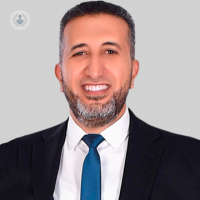What happens if atrial fibrillation is left untreated?
Written in association with:Atrial fibrillation is the medical term that is used to describe an irregular heartbeat, and can lead to stroke if not diagnosed and treated appropriately.
In our latest article, Dr Mokhtar Ibrahim, a highly established and trusted consultant cardiologist, advises patients when they should seek medical attention for atrial fibrillation, and reveals how it is diagnosed and treated.

What is atrial fibrillation, and how will I know I have it?
Atrial fibrillation is an abnormal heart rhythm. It is the most common heart rhythm disorder in adults, affecting about one per cent of the general population. The heart beats faster than normal, doing so quite irregularly.
Some people with atrial fibrillation are completely asymptomatic, and is diagnosed accidentally during a routine health check. A blood pressure machine can identify if you have an irregular heart rhythm. Other people also present with palpitations, shortness of breath, dizziness, feeling faint, and stroke. Atrial fibrillation is the most common cause of stroke.
When should I get seen for atrial fibrillation?
Any patient who is suspected of having atrial fibrillation should be seen by a cardiologist to have a full assessment. The first step is initial screening, including blood tests, and an echocardiogram for the heart.
Then, if the patient is diagnosed with atrial fibrillation, they are seen periodically by their GP and cardiologist. The cardiologist will offer the patient appropriate treatment options.
How is atrial fibrillation diagnosed?
Atrial fibrillation was traditionally diagnosed via an electrocardiogram (ECG). People who have infrequent symptoms can be given a portable monitor. Interestingly, the FDA have recently approved apple watches as effective portable monitors to be able to diagnose atrial fibrillation.
For people who do not have apple watches or technology that can diagnose atrial fibrillation, we can also implant a monitor under the skin that can keep recording and monitoring the heart rate and rhythm for as long as up to five years.
Should it be treated immediately? What happens if it is left untreated?
If a person with atrial fibrillation is above the age of 65, has hypertension, diabetes, heart failure, and has had a previous stroke, individuals need to be provided with blood thinners immediately on a life-long basis. A person could suffer from stroke if their atrial fibrillation is not treated adequately.
If the patient is completely asymptomatic, we might just treat atrial fibrillation with blood thinners and that will be enough. If patients have a significant number of symptoms, we can provide the patient with tablets to slow down the heart rate.
What should I do if I suffer from atrial fibrillation?
If patients suspect that they may be suffering from atrial fibrillation, they should immediately seek medical advice from an experienced cardiologist. In this consultation, the patient will be examined and their risk factors will be assessed.
Dr Mokhtar Ibrahim is a highly qualified consultant cardiologist and electrophysiologist. If you think that you may have atrial fibrillation, make sure you book an appointment with him today by visiting his Top Doctors profile.


